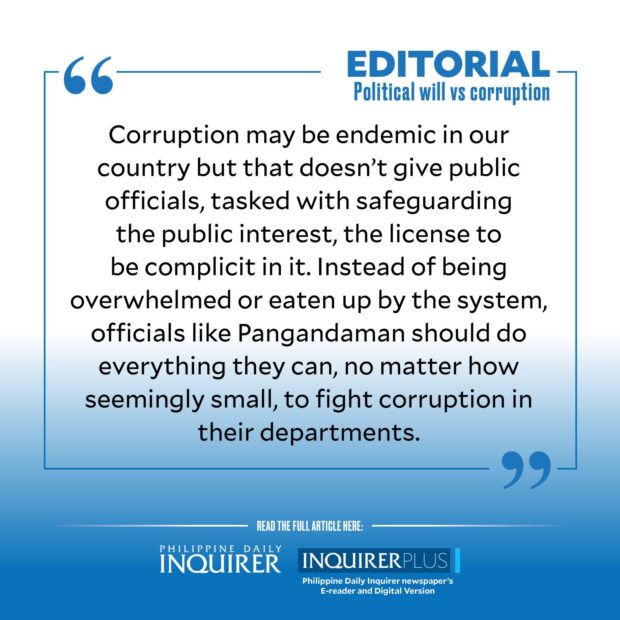Political will vs corruption
The Commission on Audit (COA) “DID NOT recommend the termination and blacklisting of the supplier” of the overpriced and outdated laptops for the Department of Education (DepEd).
This was the emphatic response of the Procurement Service of the Department of Budget and Management (PS-DBM) to a COA audit report, that cited its failure to implement a previous recommendation to blacklist the supplier of the controversial P2.4 billion worth of laptops for public school teachers.
Article continues after this advertisementThe COA recommended the “termination of contracts or blacklisting of suppliers” in its 2022 report, but noted that no action had been taken by the PS-DBM as of Dec. 31 last year. The PS-DBM, however, argued that COA did not recommend blacklisting, only the “creation of an investigation committee” which, it said, had been complied with.
And yet many months have passed and the PS-DBM has yet to come up with the result, if any, of its supposed investigation of the anomalous contract, one of a string of corruption-plagued pandemic contracts under the agency. Given the huge amount involved, why does the PS-DBM have to wait for another government agency to tell it to blacklist suppliers that have duped the government through overpriced and spurious deals? Why the hairsplitting on whether the COA recommended an investigation or a blacklisting?
This latest obfuscation only validates the COA’s 2021 report that the PS-DBM apparently favored the supplier—a joint venture of the Sunwest Construction and Development Corp., LDLA Marketing and Trading Inc., and VST ECS Philippines Inc.—over three other bidders despite its failure to meet the DepEd’s technical specifications for the laptops. Instead of disqualifying the supplier outright from the bidding because of this, the PS-DBM approved its Dell Latitude 3420 with an outdated processor and slow clock speed.
Article continues after this advertisementThe COA’s 2021 audit report noted that the laptops provided were “pricey for an entry-level laptop” at P58,300 apiece, some P23,000 more than the approved DepEd procurement request of just over P35,000. As a result, given the allocated fixed budget, the number of laptops to be delivered was significantly reduced to just over 39,000 instead of 68,500 units that were to be distributed to teachers to help them in the blended learning setup during the pandemic. Despite the huge price tag, many of the teacher-beneficiaries did not receive the laptops, some of which were reportedly later sold at low prices in online shops.
That the PS-DBM remains unscathed and unmoved by exposé after exposé of its graft-ridden contracts during the Duterte administration also points to the inaction of its mother agency, the DBM, in cracking the whip.
In August 2022, during the budget deliberations at the House, Budget Secretary Amenah Pangandaman made a promise to clean up the PS-DBM amid calls from House and Senate members to abolish the procurement body. She argued that PS-DBM was able to save the government as much as P18 billion from 2017 to 2019.
“So, I think if we give a chance to PS-DBM and if we clean the process and [its] system of procurement … maybe we can go back to its old glory,” she said.
Pangandaman said the DBM has programs “on how to fix” the PS-DBM, which the House appropriations committee asked her to submit. A year later, and we’re still waiting for those “programs.” What happened? Judging by the unrepentant demeanor of the PS-DBM on the COA’s recent recommendation, it looks like happy days will continue at the agency. And why not? No one has been put behind bars for the tainted PS-DBM deals.
The call to abolish the agency came following separate investigations conducted by the House and the Senate on the transfer of P42 billion from the Department of Health to PS-DBM in 2020, P8.7 billion of which was awarded to the undercapitalized Pharmally Corp. for the purchase of pandemic supplies. In a 113-page report, the Senate blue ribbon committee recommended a slew of graft and criminal charges against officials of the previous administration, including former president Rodrigo Duterte himself.
Yet, the Ombudsman has only meted a six-month suspension against 32 members of the PS-DBM, including its former head, Lloyd Christopher Lao, who was a key figure in the Pharmally anomaly.
With the slow wheels of justice still to touch these unscrupulous elements of government, it’s no wonder that corruption continues to permeate the bureaucracy and drag down the country’s image in the eyes of foreign investors and institutions.
Corruption may be endemic in our country but that doesn’t give public officials, tasked with safeguarding the public interest, the license to be complicit in it.
Instead of being overwhelmed or eaten up by the system, officials like Pangandaman should do everything they can, no matter how seemingly small, to fight corruption in their departments. It’s one thing to promise to fix a broken PS-DBM to forestall calls for its abolition, and quite another to actually have the will to do it.

















